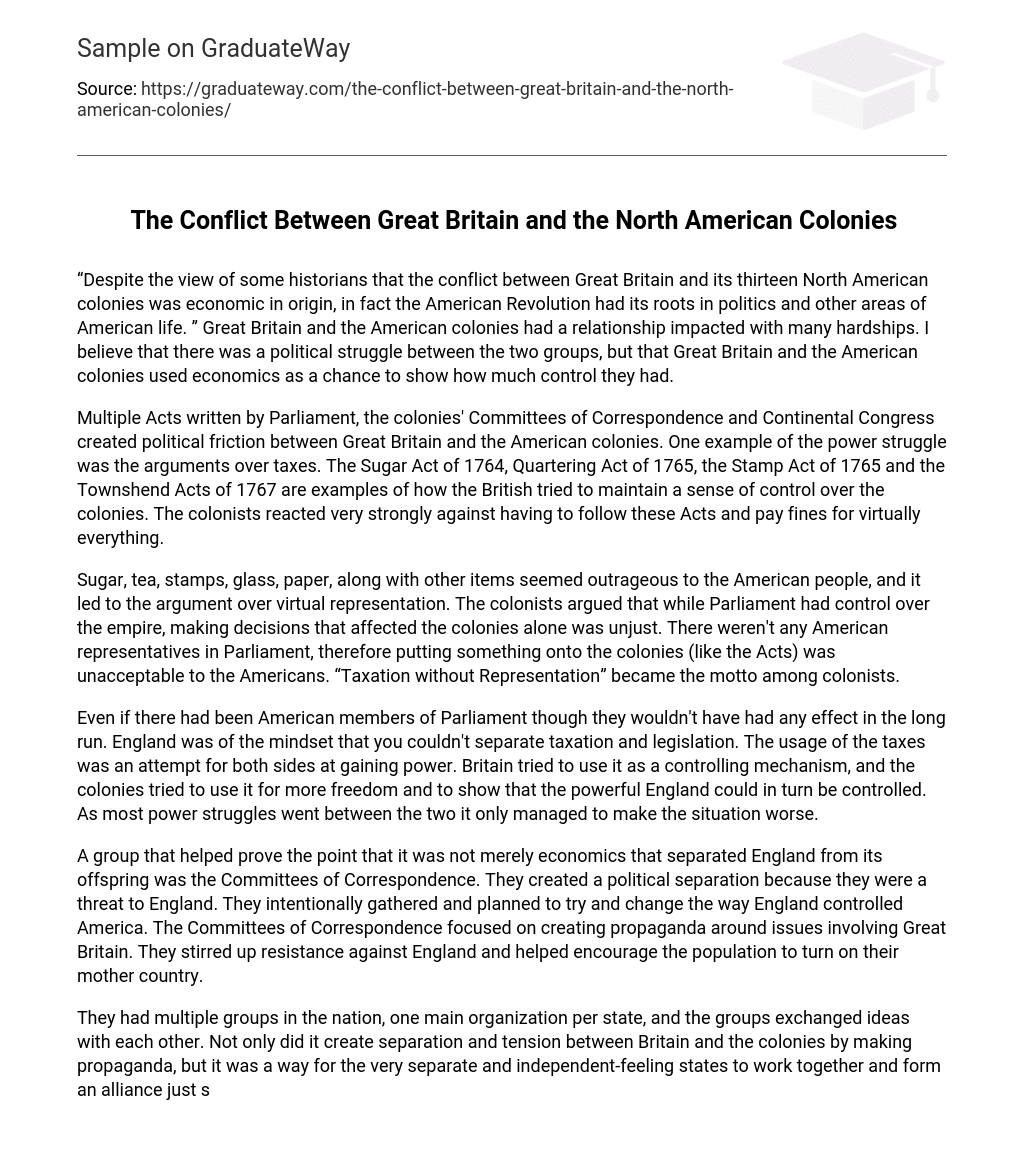“Although some historians argue that the British conflict with the North American colonies had economic origins, the American Revolution actually originated from political and other aspects of American society.” The relationship between Great Britain and the American colonies was marked by numerous challenges. It is my belief that a political struggle existed between the two parties, but both Great Britain and the American colonies exploited economic circumstances to assert their control.”
Multiple Acts written by Parliament, the colonies’ Committees of Correspondence, and Continental Congress caused political tension between Great Britain and the American colonies. The disputes primarily revolved around taxes. The Sugar Act of 1764, Quartering Act of 1765, Stamp Act of 1765, and Townshend Acts of 1767 demonstrated the British government’s efforts to exert authority over the colonies. Consequently, the colonists strongly opposed these Acts and objected to being fined for practically everything.
Sugar, tea, stamps, glass, and paper, among other items, were deemed unreasonable by the American people, sparking a dispute over virtual representation. The colonists contended that while Parliament held dominion over the empire and made decisions impacting the colonies exclusively, this was unjust. Since there were no American representatives in Parliament, imposing measures on the colonies like the Acts was deemed unacceptable by the Americans. Hence, the slogan “Taxation without Representation” emerged as the rallying cry among colonists.
Even if there were American members of Parliament, their presence would not have had any long-term impact. England believed that taxation and legislation could not be separated. Both sides used taxes as a means to gain power – Britain as a tool of control, and the colonies to assert their freedom and demonstrate that even powerful England could be controlled. However, this power struggle only exacerbated the situation.
The Committees of Correspondence, an organization that proved it was not solely economics that distinguished England from its colony, played a vital role in creating political divisions. By posing a threat to England, they deliberately gathered and strategized to challenge England’s control over America. The Committees of Correspondence primarily concentrated on generating propaganda related to matters concerning Great Britain. They effectively incited opposition against England and further influenced the population to revolt against their own mother country.
The nation consisted of various groups, each state having a primary organization. These groups communicated to share ideas, which led to the development of propaganda in order to create division between Britain and the colonies. Additionally, this communication allowed the states to unite and collaborate in confronting England during the revolution. The Continental Congress of 1774 further revealed that the division among the colonies extended beyond solely economic factors.
This group of twelve of the thirteen colonies aimed to seal the cracks between England and the American colonies rather than provoking a total rebellion and revolution. Their objective was to make a point and have the taxation laws repealed simultaneously. The creation of The Association document was their strategy, which demanded a complete boycott of British goods in the colonies. Anyone who opposed the Association faced punishment through tarring and feathering.
Additionally, in an effort to restore the peace that existed prior to the implementation of taxation Acts, a Declaration of Rights and other esteemed documents were crafted. This act of formally appealing to England despite any differences or conflicts between the colonies highlights their determination and refusal to allow the ruling power to obstruct their desires. The goal was not initially to break away from England but rather to be comprehended and heard.
Unfortunately, the requests from England’s North American colonies were rejected, leading to increased tension and adding to the already significant gap between them. The Acts, Committees of Correspondence, and the Continental Congress further drove a wedge between England and its colonies. Although some of these issues were rooted in economics, the differing political groups and interpretations of “fairness” played a crucial role in fueling the revolution. It is primarily because of these political differences that Americans are not Britons today.





